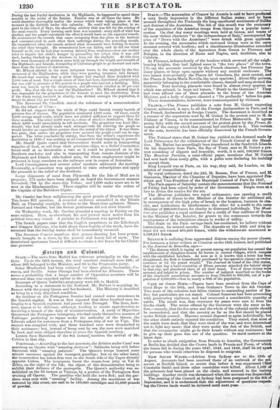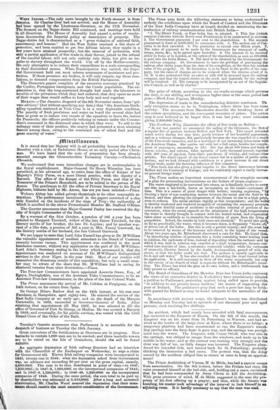iforeian anti QColonial.
Seeseer.—The news from Madrid has reference principally to the elec- tions. Up to the 16th instant, the total numbers returned were 289; of whom 203 belonged to the Ministry, and 86 to the Progresista party.
Seiior Mendizabal had been returned for three places, Santander, Co- -runna, and Seville. Seiler Olozaga had been elected for Albacete. There seems a probability that a larger number of Opposition members will be returned than was expected earlier in the election.
Rumours of Queen Isabella's pregnancy were rife in Madrid.
According to a statement in the National, Mr. Bulwer is acquiring in- fluence with the young Queen and her husband. The Ministry is described 43 being in a very disjointed condition.
An incident on the Portuguese frontier had caused some uneasiness in the Spanish capital. It was at first reported that three hundred men be- longing to a Spanish regiment had passed into Portugal. The facts, how- ever, appear to be different; although tending to create apprehension as involving a breach of the duty of nonintervention. A party of Miguelites threatened the Portuguese insurgents, who had made themselves masters of Vallongo: preferring to repass uuder the authority of the Queen, the Liberals asked for assistance from a Portuguese ship of war at Vigo. The request was complied with, and three hundred men were despatched to their assistance; but, instead of being sent by sea, the men were marched by land, and were obliged therefore to cross the Spanish territory.
Letters from Barcelona of the 9th instant: mention the arrival of Mr. Cobden in that city.
PORTUGAL.—According to the last accounts, the division under easel was marching on Oporto with "amazing slowness": Seldanha being still before Santarem with "amazing patience." The Queen's troops boasted some minute successes against the insurgent guerillas; but on the other hand, the insurrection has taken firm root on the South side of the Tagus directly opposite Lisbon. The insurgents burnt the steam-boat jetty at Val de Zebro, on the night of the 7th; the object of this demonstration being to exhibit their defiance of the metropolis. The Queen's authority was es- tablished on the 3d instant at Valence, by a portion of the Portuguese fleet cruising off Oporto. The guerillas who held the town fled; and the gar- rison went over with "amazing" facility. Among the munitions of war restored by this event, are said to be 180,000 cartridges and 51,000 pounds of powder.
ITALY.—The annexation of Cracow by Austria is said to have produced a very lively impression in the different Italian states; and to have aroused throughout the Peninsula the long-mothered sentiments of dislike and distrust of the Austrians. The 5th of this month was the centenary of the expulsion of the Austrian troops from Genoa by a popular insur- rection. On that day many meetings were held at Genoa, and toasts of the most violent character " to the independence of Italy," accompanied by cries of " Down with the Austrians!" were drunk with great applause. In the evening, the mountains which surround Genoa were at the same moment covered with bonfires; and a simultaneous illumination extended over the whole chain of the Apennines from Genoa to Florence and Bologna, in the direction of Rome and Naples, and, doubtless, also te Calabria.
At Florence, independently of the bonfires which crowned all the neigh- bouring heights, they had lighted some in "the two places" of the town. [ So say the accounts received by the French channel; but Florence has many piazze, or large open squares without any central enclosure. The two meant were probably the Piazza del Granduca, the most central, and the Piazza di Santa Maria Novella, the most spacious.] About fifty persons, apparently belonging to the comfortable classes, danced and sang around the bonfires. Next morning, placards were found in almost every quarter, on which was printed, in large red letters, "Death to the Germans!" They had even affixed one of these placards to the house of the Austrian Minister, and a body of singers chanted a "De profundis" before his gate.
These demonstrations, however, were unaccompanied by violence.
FussNen.—The France publishes a note from M. Guizot respecting Cracow, addressed, it says, to all the Foreign Ambsesedors in Paris, and to the French Ambassadors at foreign Courts. The document is described as a resume of the arguments used by M. Guizot in the protest sent to M. de Flahaut at Vienna, to be communicated to Prince Metternich. It agrees pretty fully with the second account of the protest given by the Presse, di- vested of the energy which that journal had attributed to it. This version of the note, however, has been officially disavowed by the French Govern- ment.
The National states that M. Guizot has yielded to the demand made by Lord Palmerston for the withdrawal of the French Consul at the Mauri- tius. Mr. Barbet has accordingly been transferred to the Sandwich Islands. On his departure from Paris, the Bey of Tunis sent to M. Guizot a pre- sent consisting of slippers and bracelets, worth, it is said, 100,000 francs. The Noniteur Parisien, a semi-official paper, mentions that M. Guizot had sent back these costly gifts, with a polite note declaring his inability to accept them. King Leopold was at Paris, on his way, they said, for London, on his mission of reconciliation.
By royal ordinance, dated the 22d, M. Beason, Peer of France, and M. Grameeron, Member of the Chamber of Deputies, have been appointed Pre- sident and Vice-President of the Municipal Council of Paris for 1847.
The Paris papers of Saturday contain the announcement that the National of Friday had been seized by order of the Government. People were at a loss to divine the motive for the act.
The Moniteur publishes two royal ordinances; one opening a credit of a million of francs to the Minister of the Interior for additional aid, in consequence of the high price of bread, to the hospices, bureaux de cha- rite, and institutions de bienfaisance; the other for a credit to the same Minister of 200,000 francs for charity to distressed individuals. The Muni- teur also publishes a royal ordinance for a credit of four millions of francs to the Minister of the Interior, for grants to the communes towards the employment of the industrious classes in works of utility. The drain on the Paris savings-bank has continued, we believe without intermission, for several months. The deposits on the 20th and 21st in- stant did not exceed 489,498 francs, while the withdrawals amounced to 4.528,211 francs.
BELGIUM is suffering from aggravated distress among the poorer classes. For instance, a letter written at Courtrai on the 18th instant, and published in the Journal de Bruxelles, says- " The distress which is raging at present among our population has caused the establishment of slaughter-houses for horses in several villages, which compete with the established butchers. As soon as it is known that a horse has been slaughtered, the flesh is immediately purchased by the operative classes at twelve centimes or ld. the pound weight." The Journal de Goad of the 19th states, that on that day a band consisting of fifteen persons attseked the bakers' shops in that city, and plundered them of all their bread. Two of these rioters were arrested and lodged in prison. The number of indigent inscribed on the books of the charitable associations amounts to from 700,000 to 800,000, out of a po- pulation of 4,000,000—that is, nearly a fifth of the population.
CAPE OF GOOD HOPE.—Papers have been received from the Cape of Good Hope to the 10th, and from Graham's Town to the 4th October. Two more of the colonists had fallen victims to marauding parties of Ka- fue; but particulars are not stated. Colonel Somerset had been proceeding with persevering vigilance, and had recovered a considerable quantity of cattle. The result was, that overtures for peace were sent in from the Gocha chiefs. The terms offered by the Governor were the same as be- fore,—namely, that the fire-arms and the whole of the colonial cattle should be surrendered, and that the country as far as the Kei should be placed under British control. Macomo seemed disposed to agree individually, but the other chiefs entirely rejected the conditions. They stated, that most of the cattle were dead; that they were tired of the war, and were determined not to fight any more; that they were under the feet of the British, and that the commander might go to their kraals without any resistance; but to give up their guns was out of the question. So stood matters at the latest date.
In order to check emigration from Prussia to America, the Government at Berlin has decided that the Crown lands in Prussia and Posen, of which the leases fall in during the years 1847, 1848, and 1849, shall be set apart for persons who would otherwise be disposed to emigrate.
NEW Souris Wmaes.—Advices from Sydney are to the 19th of August. Accounts had been received there of an outbreak of the poi- soners at Norfolk Island, so severe that before it was suppressed Chief Constable Smith and three other constables were killed. About 1,100 of the prisoners had been placed on the chain, and secured in the various buildings Another revolt was threatened when the account was despatched.
The meeting of the Council at Sydney had been postponed to the 8th of September, and it is understood that the adjustment of questions respect- ing the Crown lands would be deferred until next year.
WEST Ismss.—The only news brought by the Forth steamer is from Jamaica. Sir Charles Grey had not arrived; and the House of Assembly bad been opened by the Lieutenant-Governor, on the 17th November. The ferment on the Sugar-duties Bill continued, and meetings were held In all directions. The House of Assembly had passed a series of resolu- tions denouncing the Imperial policy as destructive of property. The Sugar-duties Act is characterized as a "gross violation of national faith, consistency, and honour." Had the West Indies retained a fair share of protection, and been enabled to get free African labour, they might in a few years have attained prosperity; but the removal of protection, with only a partial application of free trade in their favour, joined to the refusal of the needful labour, will not only entirely ruin them, but give an im- pulse to slavery throughout the world. Cut off by the Mother-country, the only alternative is to reduce their expenditure to a scale corresponding to their diminished means. When Emancipation was carried, the Impe- rial Government held out most solemn assurances of assistance and pro- tection. If those promises are broken, it will only remain, say these reso- lutions, to demand compensation from the British Parliament.
The Demerara papers complain of the excessive economy practised by the Coolies, Portuguese immigrants, and the Creole population. The ex- planation is, that the long-continued drought had made the labourers so sensible of the privations which they had endured, that they spent no more of their wages than would suffice to keep body and soul together.
MEXIC0.—The Jamaica Despatch of the 9th November states, from" pri- vate advices," (but without specifying any date,) that "the American block- ading squadron stationed at Vera Cruz is in a very deplorable condition. The paucity of fresh provisions and water on board the several ships had been so great as to induce two vessels of the squadron to leave the station for Pensacola; the officers positively refusing to remain under the Commo- dore's command in the distressed state in which they were. To add to the unhappy state of their position, the scurvy had presented a most alarming feature among them, owing to the continued use of salted food and the great scarcity of water."































 Previous page
Previous page